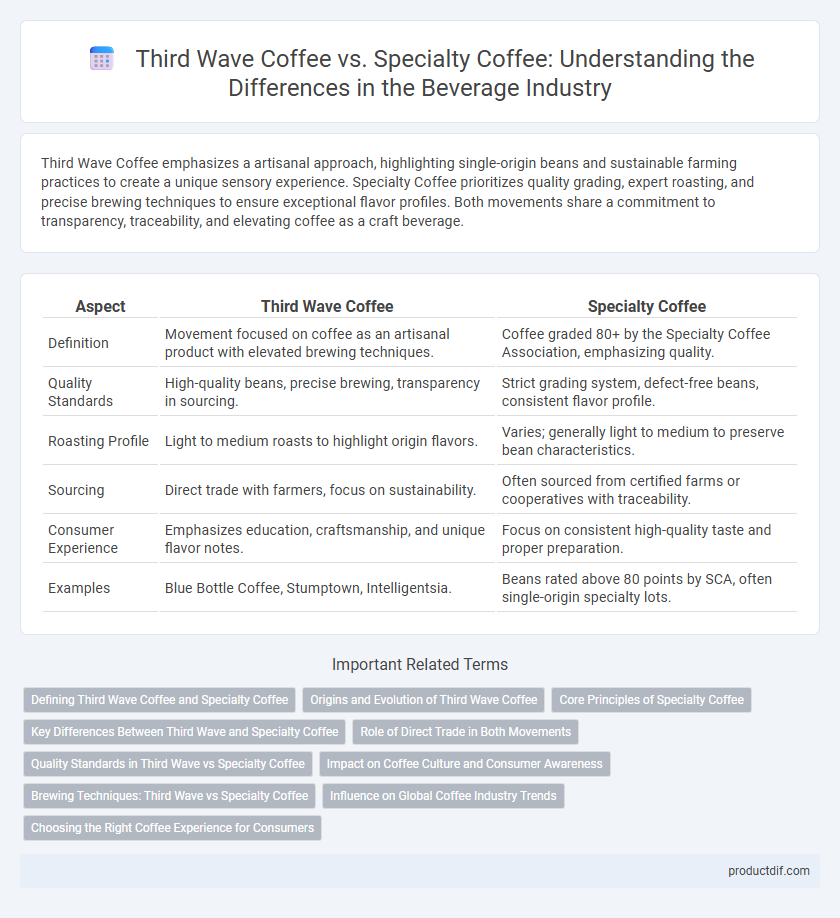Third Wave Coffee emphasizes a artisanal approach, highlighting single-origin beans and sustainable farming practices to create a unique sensory experience. Specialty Coffee prioritizes quality grading, expert roasting, and precise brewing techniques to ensure exceptional flavor profiles. Both movements share a commitment to transparency, traceability, and elevating coffee as a craft beverage.
Table of Comparison
| Aspect | Third Wave Coffee | Specialty Coffee |
|---|---|---|
| Definition | Movement focused on coffee as an artisanal product with elevated brewing techniques. | Coffee graded 80+ by the Specialty Coffee Association, emphasizing quality. |
| Quality Standards | High-quality beans, precise brewing, transparency in sourcing. | Strict grading system, defect-free beans, consistent flavor profile. |
| Roasting Profile | Light to medium roasts to highlight origin flavors. | Varies; generally light to medium to preserve bean characteristics. |
| Sourcing | Direct trade with farmers, focus on sustainability. | Often sourced from certified farms or cooperatives with traceability. |
| Consumer Experience | Emphasizes education, craftsmanship, and unique flavor notes. | Focus on consistent high-quality taste and proper preparation. |
| Examples | Blue Bottle Coffee, Stumptown, Intelligentsia. | Beans rated above 80 points by SCA, often single-origin specialty lots. |
Defining Third Wave Coffee and Specialty Coffee
Third Wave Coffee emphasizes artisanal methods, single-origin beans, and a focus on flavor transparency from farm to cup, treating coffee as a craft beverage rather than a commodity. Specialty Coffee is defined by its high-quality Arabica beans scoring above 80 points on the Specialty Coffee Association scale, meticulous sourcing, and strict quality control throughout processing and roasting. Both Third Wave and Specialty Coffee prioritize sustainability, traceability, and exceptional taste but differ in cultural approach and emphasis on the coffee experience.
Origins and Evolution of Third Wave Coffee
Third Wave Coffee emerged in the early 2000s as a movement emphasizing artisanal, single-origin beans with meticulous sourcing and roasting techniques, distinguishing itself from traditional Specialty Coffee. Its origins trace back to pioneering coffee roasters and baristas in the United States who prioritized transparency, sustainability, and a nuanced flavor profile. The evolution of Third Wave Coffee has reshaped the industry by promoting direct trade relationships, innovative brewing methods, and a deeper appreciation for coffee as a craft beverage.
Core Principles of Specialty Coffee
Specialty coffee emphasizes quality from bean to cup, focusing on origin, traceability, and meticulous processing to highlight unique flavor profiles. It prioritizes ethical sourcing, sustainable farming practices, and direct trade relationships with farmers to ensure consistency and transparency. Core principles also include precise roasting techniques and skilled brewing methods to preserve the coffee's inherent characteristics.
Key Differences Between Third Wave and Specialty Coffee
Third Wave Coffee emphasizes artisanal, single-origin beans with a focus on transparency and unique flavor profiles, while Specialty Coffee refers to high-quality coffee that scores above 80 points on industry grading scales regardless of origin. Third Wave roasters prioritize sustainable farming practices and direct trade relationships, promoting traceability and ethical sourcing. Specialty Coffee, although also high-grade, encompasses a broader category that includes but does not exclusively focus on the same level of craftsmanship or narrative as Third Wave Coffee.
Role of Direct Trade in Both Movements
Direct trade plays a crucial role in both Third Wave Coffee and Specialty Coffee movements by fostering transparent relationships between roasters and farmers, ensuring higher quality beans and fair compensation. Third Wave Coffee emphasizes direct trade to highlight unique flavors and terroir, elevating coffee to an artisanal product. Specialty Coffee also relies on direct trade to improve sustainability, traceability, and ethical sourcing, ultimately enhancing consumer trust and product excellence.
Quality Standards in Third Wave vs Specialty Coffee
Third Wave Coffee emphasizes artisanal quality with a focus on traceability, single-origin beans, and precise brewing techniques to enhance unique flavor profiles. Specialty Coffee adheres to stringent quality standards established by the Specialty Coffee Association, including scoring 80 points or above on a 100-point scale, ensuring premium grade beans and consistent cup quality. Both movements prioritize high-quality beans, but Third Wave Coffee integrates a more holistic approach that celebrates coffee as an artisanal craft.
Impact on Coffee Culture and Consumer Awareness
Third Wave Coffee emphasizes artisanal methods, highlighting traceability and sustainable sourcing to elevate consumer awareness about coffee origins. Specialty Coffee prioritizes quality grading and expert brewing techniques, fostering appreciation for flavor complexity and craftsmanship. Both movements significantly influence coffee culture by inspiring more informed and conscientious consumption choices.
Brewing Techniques: Third Wave vs Specialty Coffee
Third Wave Coffee emphasizes precise brewing techniques such as pour-over, siphon, and AeroPress to highlight unique bean origins and flavor profiles. Specialty Coffee focuses on consistency and quality control through methods like espresso and drip brewing, ensuring a balanced and refined cup. Both approaches prioritize meticulous grinding, water temperature, and brewing time to optimize taste and aroma.
Influence on Global Coffee Industry Trends
Third Wave Coffee revolutionized the global coffee industry by emphasizing artisanal brewing techniques, sustainable sourcing, and direct trade with coffee farmers, which elevated consumer expectations for quality and ethical standards. Specialty Coffee, characterized by its high-quality beans scored 80+ by the Specialty Coffee Association (SCA), influenced trends by promoting traceability, single-origin profiles, and intricate flavor narratives. Both movements synergistically shaped global coffee consumption, driving innovation in brewing technology and expanding the market for premium coffee experiences.
Choosing the Right Coffee Experience for Consumers
Third Wave Coffee emphasizes artisanal methods, highlighting single-origin beans and meticulous brewing techniques to create unique flavor profiles that appeal to connoisseurs seeking a handcrafted experience. Specialty Coffee is defined by rigorous quality standards and scoring above 80 points on the Specialty Coffee Association scale, ensuring consistent excellence and traceability from farm to cup. Consumers choosing between these options should consider their preference for distinct, innovative flavors versus certified quality and consistency when selecting their ideal coffee experience.
Third Wave Coffee vs Specialty Coffee Infographic

 productdif.com
productdif.com